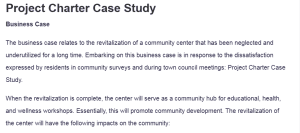Project Charter Case Study
Business Case
The business case relates to the revitalization of a community center that has been neglected and underutilized for a long time. Embarking on this business case is in response to the dissatisfaction expressed by residents in community surveys and during town council meetings: Project Charter Case Study.
When the revitalization is complete, the center will serve as a community hub for educational, health, and wellness workshops. Essentially, this will promote community development. The revitalization of the center will have the following impacts on the community:
- On the social front, the community center will enhance interaction among community members, which in turn can foster opportunities among themselves. Further, this can reduce the social isolation of some community members.
- On the economic front, the project will boost the revenue for nearby businesses and raise revenue for center rentals as more traffic who are potential customers will visit the center.
- On the cultural front, the center will attract tourists to tour local events to get a glimpse of community traditions. Essentially, this will enhance the town’s identity and increase its pride.
Project Scope
The community center renovation will include structural renovations, technology upgrades, interior design enhancements and program development. Structural renovations will include modern floor and roof repairs, while technology upgrades will entail Wi-Fi installation, computer workstations, and new audio-visual equipment. Interior design enhancements will include new furniture and repainting of the walls, while program developments will see the center having a fitness class.
The project will exclude three aspects. First, external landscaping and parking lot repairs will be excluded. Second, additional expansion beyond the existing building or new building set-up will be excluded. Lastly, permanent staffing changes will be excluded from the project.
Milestones and Acceptance Criteria
Milestone 1: Structural Renovations Completion
Acceptance criteria: All structural repairs will be accepted if they meet local building requirements. Notably, this will be obtained through inspection by relevant authorities. The first milestone will be accomplished within the first three months.
Milestone 2: Program Launch and Reopening
Acceptance criteria: The intended programs, as specified in the project inclusions, will be launched in the center before it is officially opened. The second milestone will be completed by the sixth month.
Assumptions
The project will be based on the assumptions given below:
- Local contractors have enough capacity to meet the project-set guidelines and timelines.
- Community members will participate in the programs to be launched for the community center once it is completed.
- The set budget of $100,000 is enough to cover all renovation and program development costs without major overages.
Risks and Mitigation Strategies
There is a risk that any fault or delay in the availability of local contractors will affect the six-month deadline that is set. As a measure to mitigate this risk, secure contracts will be made with multiple vendors in the planning phase of the contract to avoid dependence on a single contractor. Another anticipated risk is that the revitalization may not attract sufficient community participation. Therefore, there will be an outreach campaign within the community to engage the residents a few days before reopening the center.
Stakeholder List
Internal Stakeholders
Three internal stakeholders include the town council, project manager and community center staff. The town council is a stakeholder because it offers oversight and approves major decisions, while the project manager is a stakeholder because of the responsibility to coordinate resources and people to ensure the project is completed on time. Community center staff are stakeholders because they will be involved in the center’s daily activities.
External Stakeholders
Community residents, local contractors and grant providers form external stakeholders. Notably, this is because their contact with the project is secondary. However, their contribution influences the project’s success.
ORDER A PLAGIARISM-FREE PAPER HERE
We’ll write everything from scratch
Question 
Case Study: Community Center Revitalization Project
Background: A small town’s community center has been underused and neglected for several years. The town council has received a grant to revitalize the center, aiming to turn it into a vibrant hub that meets the current needs of the community. The project involves structural renovations, technology upgrades, and program development to cater to different age groups and interests.
Objective: The primary objective of the project is to increase the usage of the community center by 50% within the first year after reopening. This should be achieved by making the center more appealing and functional for various community activities, including educational workshops, health and wellness programs, and cultural events.
Project Constraints:
- Budget: The project has a fixed budget of $100,000, provided by the grant.
- Time: The revitalization needs to be completed within six months to meet the grant’s stipulated timeline.
- Resources: Limited local vendors and contractors, which could affect both pricing and availability.
Assignment: Students are tasked with developing a project charter for the Community Center Revitalization Project. They must address the following components in their charter:

Project Charter Case Study
- Business Case:
- Justify the need for the project based on community feedback and potential benefits.
- Outline the expected impact on the community, consider social, economic, and cultural improvements.
- Project Scope:
- Clearly define what will be included in the renovation.
- Specify what will be excluded to prevent scope creep.
- Milestones and Acceptance Criteria:
- Create two relevant milestones. (The milestones should be specific activities that can be measured, not broad like “planning”).
- Define acceptance criteria for each milestone to ensure each phase meets its goals.
- Assumption: Identify 3 assumptions.
- Risks and Mitigation Strategies:
- Identify at least two potential risks.
- Propose one mitigation strategies for each identified risk.
- Stakeholder List:
- Identify at least 3 internal and 3 external stakeholders
- Define why each is a stakeholder
Your Assignment: A project charter that includes the areas identified above.